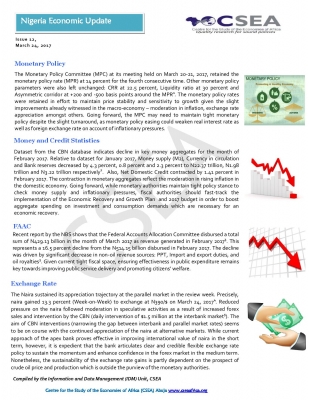Macroeconomic Report & Economic Updates

April 4, 2017
Nigeria Economic Update (Issue 12)
The Naira sustained its appreciation trajectory at the parallel market in the review week. Precisely, naira gained 13.3 percent (Week-on-Week) to exchange at N390/$ on March 24, 2017. Reduced pressure on the naira followed moderation in speculative activities as a result of increased forex sales and intervention by the CBN (daily intervention of $1.5 million at the interbank market.) The aim of CBN interventions (narrowing the gap between interbank and parallel market rates) seems to be on course with the continued appreciation of the naira at alternative markets. While current approach of the apex bank proves effective in improving international value of naira in the short term, however, it is expedient that the bank articulates clear and credible flexible exchange rate policy to sustain the momentum and enhance confidence in the forex market in the medium term. Nonetheless, the sustainability of the exchange rate gains is partly dependent on the prospect of crude oil price and production which is outside the purview of the monetary authorities.
